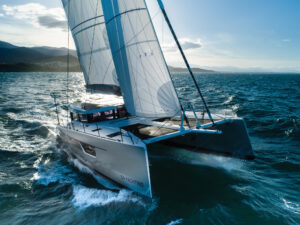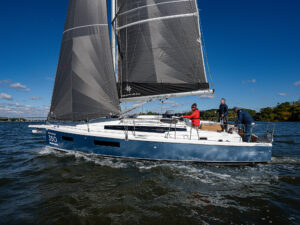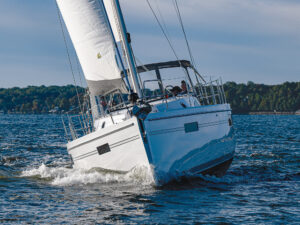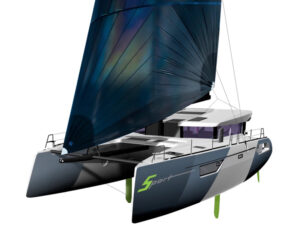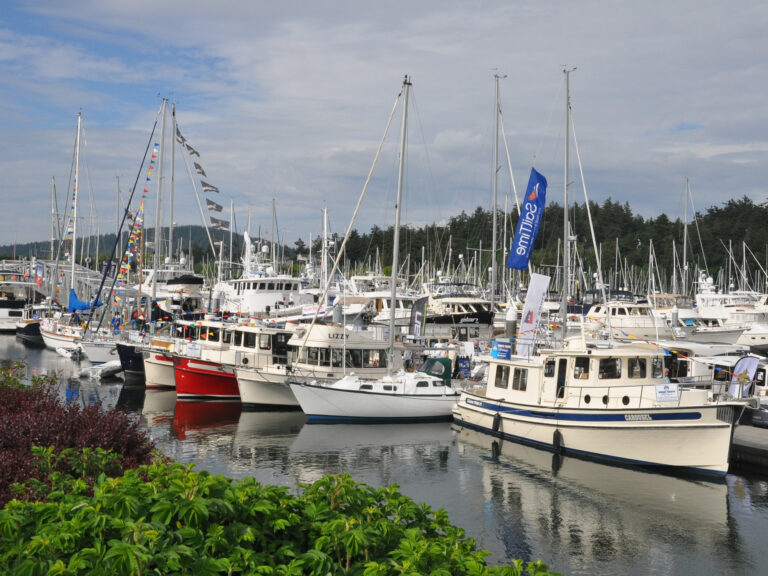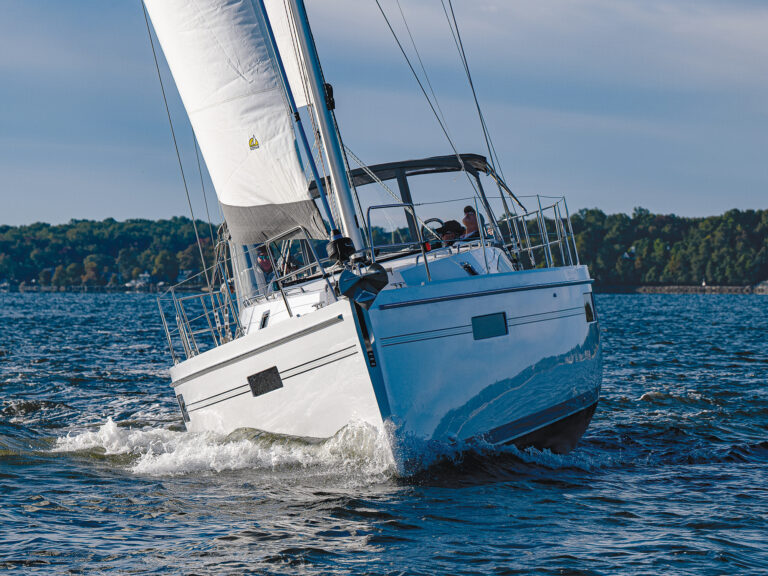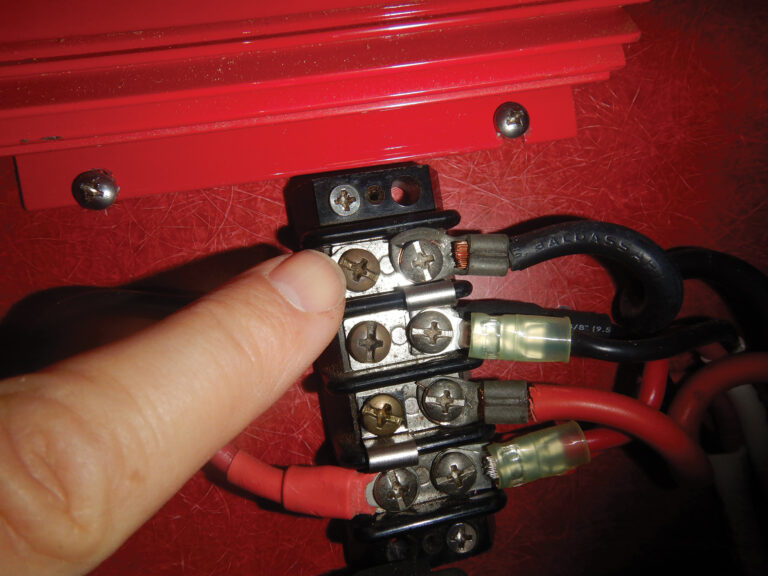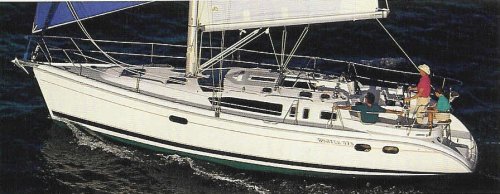
The Hunter 376 is proof that when a boatbuilding outfit listens to its customers and cares enough to do a good job, everybody wins. In today’s market, this boat is priced so that many aspiring cruisers can afford to own and cruise one — but it isn’t cheaply built. Perhaps most important, it is built with an understanding of real-world cruising needs, from the obvious to the subtle.
Real-world maintenance forms the foundation of successful cruising. On that score, engine access aboard the Hunter 376 is stupendous. A well insulated box hinges up on a pneumatic lift to reveal a 36-horsepower Yanmar actually sitting out in the open, all sides available for servicing, even for the removal of major components.
Looking up, cabin headliners have inspection locations to access the backs of thru-deck fittings. Looking down, thru-hulls are easy to get at, neatly labeled and backed. The bilge pump is mounted on a platform that pulls up for straightforward access to both pump and strainer. The electrical panel comes equipped with a handy wiring diagram. Heavy-duty, heavily insulated electrical cable runs through anti-chafe conduit. An owner’s manual educates you on the boat’s systems. Missing are large amounts of high-maintenance exterior teak, but solid and conspicuous is a tough no-nonsense rub rail to protect the hull while docking, rafting and warping around pilings.
Cruising value is all about live-aboard comfort, too. Judiciously, the Hunter 376 offers a separate shower stall independent of the head, a feature considered by many a must when two or more are out on the water for any length of time. All hanging lockers are cedar lined. The forward stateroom has, in addition to one of these, plenty of drawers, a vanity with its own mirror and sink, and a window in the cabin bulkhead that opens into the saloon.
The galley to starboard is near the companionway to facilitate the passing up of food, and just aft of the dining area for convenient serving below. It includes Corian countertops, a three-burner propane stove with oven, two stainless steel sinks, a heavily insulated dual icebox and a microwave.
Seating in the saloon is exceptionally comfortable, obviously designed and angled for real bodies, not cardboard dummies. Fine woodwork, shelves for books and a standard CD stereo system increase the ambience. A wraparound deck skylight brings in plenty of residual natural light; in fact ventilation and lighting are abundant here and throughout the boat, which enjoys nine opening hatches with screens, seven opening ports with screens and seven fixed hull ports.
The master stateroom aft is located under the cockpit, but you can stand up, sit up in bed or on a small settee, store clothes in two small cedar-lined hanging lockers and drawers, put books and personal items on shelves, gain private access to the head and shower, watch the waves around you through hull ports, or look up at the stars at night through large opening hatches over your head.
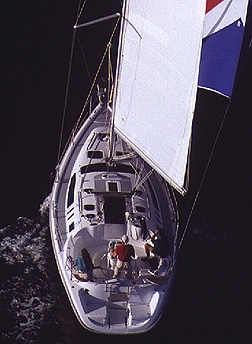
hunt376.jpg
Topside, the cockpit coaming at the widest point in its oval shape extends out to the gunwales to maximize usable space. The cockpit is comfortable to sit in and boasts a user-friendly pedestal with an easily accessed inspection port for repairs and add-ons, plus a folding table. The cockpit serves as the operational center of the boat because all running rigging leads here. In addition, it opens aft to the stern platform for swimming, dinghy landing and outside showering. Beyond the hinged helmsman’s seat, two corner seats in the pushpit aft make for great perches under way. The deck is uncluttered, with easy foot passage forward from the cockpit all the way up to the heavy-duty dual-anchor rollers at the stemhead.
At this point you’re apt to be thinking that the boat is all comfort and no performance. Think again. Hunter has become of late a leader in the development of the deck-stepped fractional rig, with shrouds led aft through swept-back spreaders in lieu of a permanent backstay. This encourages a smaller foresail that’s easier to tack and a much larger, fully battened mainsail. The mainsail’s enhanced roach carried aloft makes it more efficient overall. The rig is drawn from a BOC-tested B&R design in which the shrouds terminate at chain plates attached to the hull’s stress-spreading grid. Instead of conventional four-point standing rigging, Hunter relies on a three-point system with one set fixed every 120 degrees. This, they note, can be compared to the notion of a three-legged stool, more stable than one with four legs.
This boat comes with a cast-lead bulb-wing keel of 5’0″ shoal draft or, optionally, 6’6″ deep draft. The keel is bolted on with seven 1″ 316-grade stainless bolts. This writer prefers an integral keel with internal lead ballast, but many differ on this topic. The rudder is carried by a tapered 5.5-inch-diameter reinforced fiberglass rudderpost. The anti-osmotic vinylester hull features solid hand-laid glass laminate below the waterline and balsa core above. The deck is cored with marine-grade plywood, except for load areas which are solid.
Many standard items, in addition to those noted, are sure to inspire any new boat buyer. These include cockpit speakers, a hot water heater, four life jackets, handheld flares, two fire extinguishers, tank gauges, cabin fans, anchor and rode, dishes, furling jib, Dutchman Mainsail Flaking System, wind vane, VHF radio and even a copy of Chapman’s. A winner, to say the least.

